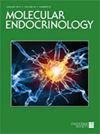Endometrial Expression of Steroidogenic Factor 1 Promotes Cystic Glandular Morphogenesis.
Q Biochemistry, Genetics and Molecular Biology
引用次数: 22
Abstract
Epigenetic silencing of steroidogenic factor 1 (SF1) is lost in endometriosis, potentially contributing to de novo local steroidogenesis favoring inflammation and growth of ectopic endometrial tissue. In this study, we examine the impact of SF1 expression in the eutopic uterus by a novel mouse model that conditionally expresses SF1 in endometrium. In vivo SF1 expression promoted the development of enlarged endometrial glands and attenuated estrogen and progesterone responsiveness. Endometriosis induction by autotransplantation of uterine tissue to the mesenteric membrane resulted in the increase in size of ectopic lesions from SF1-expressing mice. By integrating the SF1-dependent transcriptome with the whole genome binding profile of SF1, we identified uterine-specific SF1-regulated genes involved in Wingless and Progesterone receptor-Hedgehog-Chicken ovalbumin upstream promoter transcription factor II signaling for gland development and epithelium-stroma interaction, respectively. The present results indicate that SF1 directly contributes to the abnormal uterine gland morphogenesis, an inhibition of steroid hormone signaling and activation of an immune response, in addition to previously postulated estrogen production.子宫内膜类固醇生成因子1的表达促进囊性腺的形态发生。
在子宫内膜异位症中,类固醇生成因子1 (SF1)的表观遗传沉默缺失,可能导致局部新生类固醇生成,有利于异位子宫内膜组织的炎症和生长。在这项研究中,我们通过一种新的小鼠模型,在子宫内膜中有条件地表达SF1,来研究SF1表达在异位子宫中的影响。体内SF1的表达促进了子宫内膜腺增大的发育,并减弱了雌激素和孕激素的反应性。自体子宫组织移植到肠系膜诱导子宫内膜异位症导致sf1表达小鼠异位病变大小增加。通过整合SF1依赖的转录组和SF1的全基因组结合谱,我们鉴定出子宫特异性的SF1调节基因,分别参与无翼和孕激素受体-刺猬-鸡卵白蛋白上游启动子转录因子II信号传导,参与腺体发育和上皮-间质相互作用。目前的结果表明,除了先前假设的雌激素产生外,SF1还直接导致子宫腺形态发生异常,抑制类固醇激素信号和激活免疫反应。
本文章由计算机程序翻译,如有差异,请以英文原文为准。
求助全文
约1分钟内获得全文
求助全文
来源期刊

Molecular endocrinology
医学-内分泌学与代谢
CiteScore
3.49
自引率
0.00%
发文量
0
审稿时长
12 months
期刊介绍:
Molecular Endocrinology provides a forum for papers devoted to describing molecular mechanisms by which hormones and related compounds regulate function. It has quickly achieved a reputation as a high visibility journal with very rapid communication of cutting edge science: the average turnaround time is 28 days from manuscript receipt to first decision, and accepted manuscripts are published online within a week through Rapid Electronic Publication. In the 2008 Journal Citation Report, Molecular Endocrinology is ranked 16th out of 93 journals in the Endocrinology and Metabolism category, with an Impact Factor of 5.389.
 求助内容:
求助内容: 应助结果提醒方式:
应助结果提醒方式:


